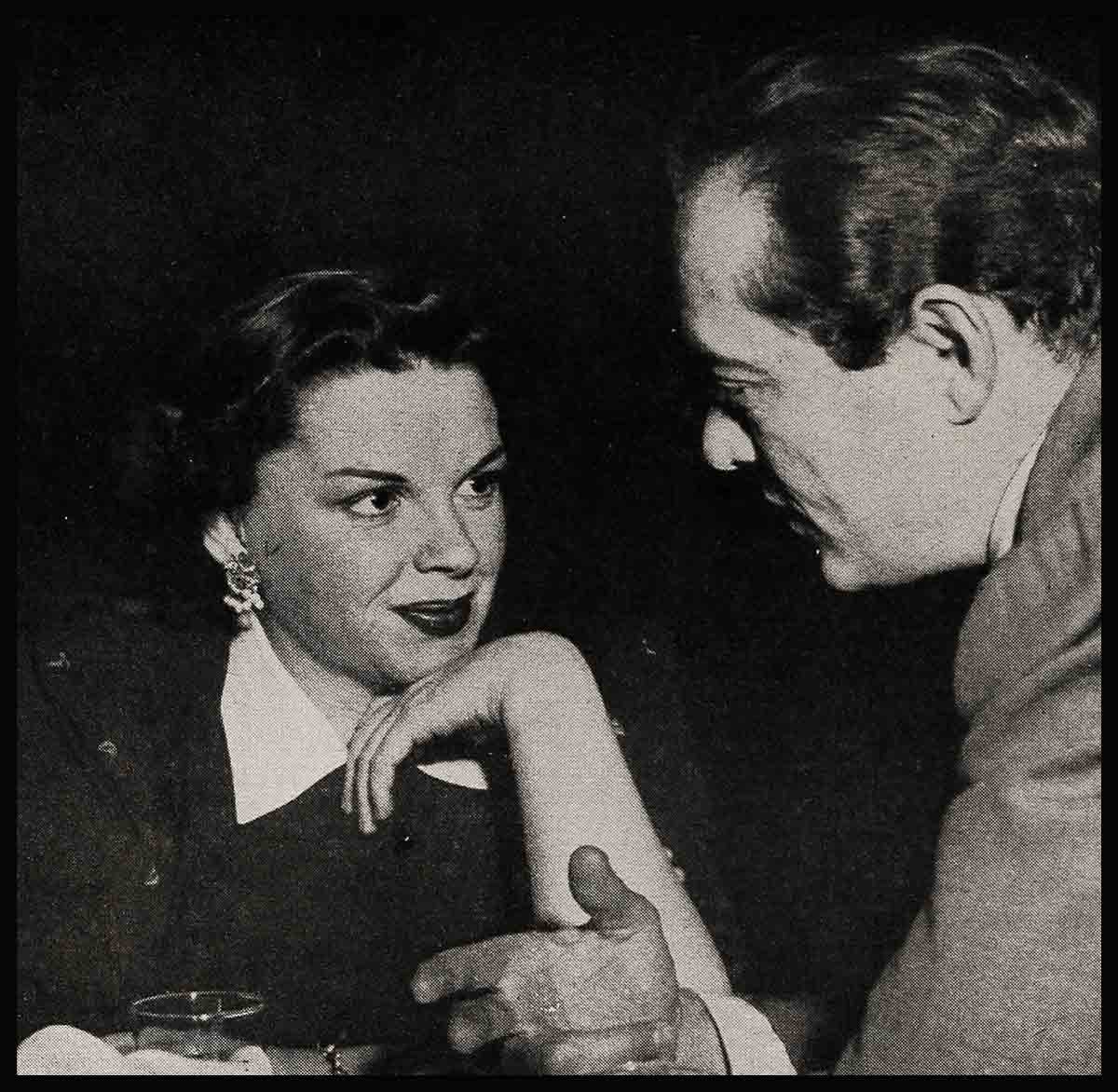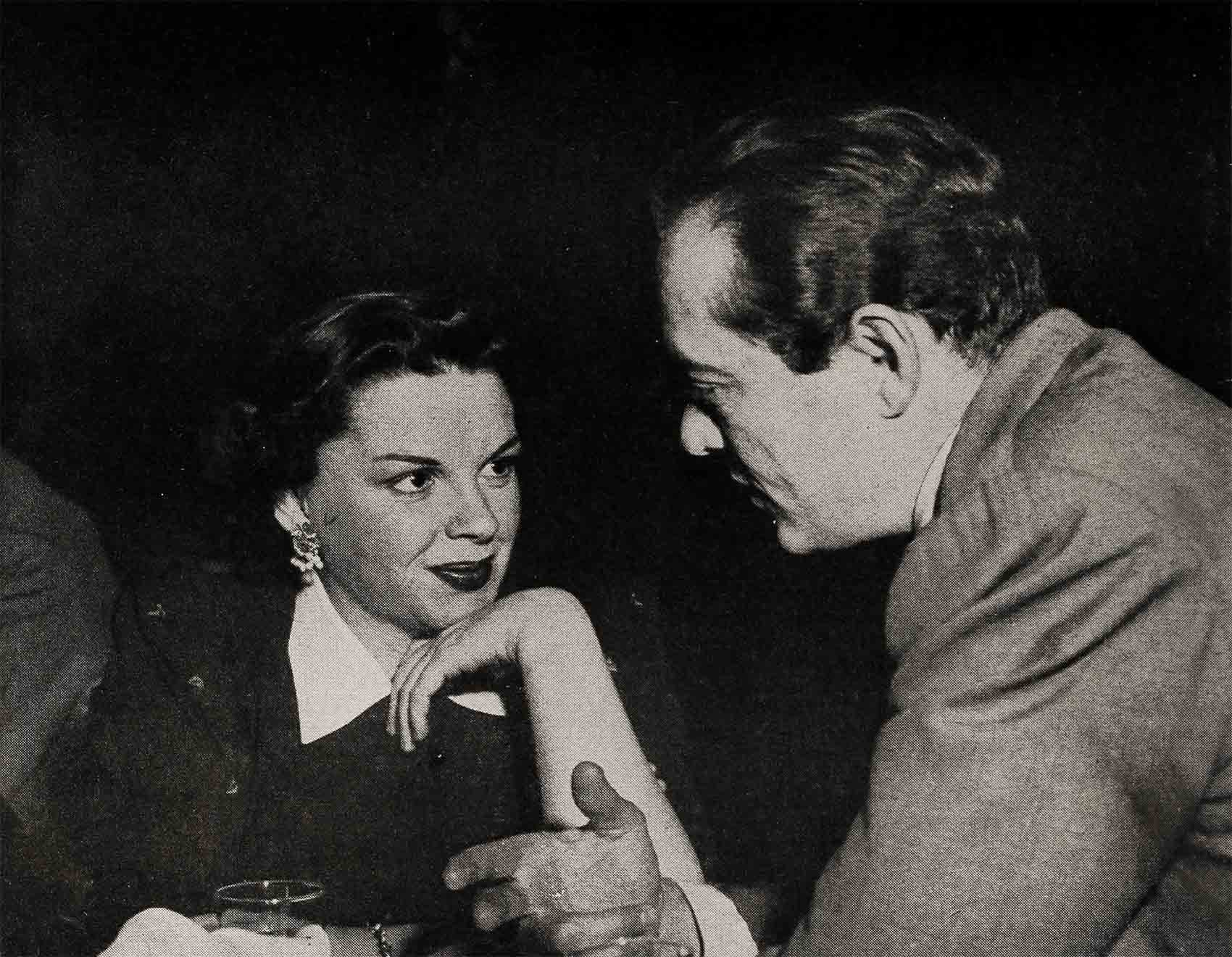
Judy Garland: “Someone To Watch Over Me”
For Judy Garland, the past few years have been filled with frustrations and unhappiness, but the nightmare was blotted out by the cheers and bravos of a tear-swept audience one April night last year at the Palladium. In the wings, the man she loved stood proudly by. The presence of Sid Luft made her happiness complete.
He was standing by her side again a few weeks ago on Judy’s closing night at the Palace theatre. In her dressing room, in one of her rare interviews, the twice-divorced star told this writer why she had chosen Sid Luft to be her husband.
“Any woman who’s a real woman wants a man to protect her and love her,” she said. “That’s what Sid does for me. We have accomplished so much together.”
The facts are there to prove it.
Directly over her brown head, as she spoke, was a new but permanent fixture on the wall, a gleaming, gold plaque which read:
“This was the dressing room of JUDY GARLAND who set the all-time long run record Oct. 16th, 1951, to Feb. 24th, 1952, RKO PALACE THEATRE.”
For 20 exciting, song-filled weeks, the star who had tried to end her life in despair before she met Sid Luft, had made show business history. Not only had she become the world’s highest paid performer, but she was acknowledged by all to be tops in her profession. Sophie Tucker, the grand old veteran of song, had wept on opening night at the comeback drama of the glorious Garland voice and sense of showmanship.
Looking back over those satisfying weeks, Judy said, “This whole thing at the Palace has been magical.” Huddled in her cotton dressing-gown, she looked youthful and slender once again.
“Sid has done it for me,” she said simply.
He re-entered the room which he had left when Judy started to discuss her feelings for him.
“That’s my fella,” she praised as she watched him adoringly through the dressingtable mirror. Brown-haired, brown-eyed, with much the same coloring as Judy, the soft-spoken Luft is tall, slender and handsome.
There is no inordinate display of affection from this couple in love. Just a quiet acceptance and understanding of what each means to the other.
The telephone rang. It was for Luft who was arranging some last minute details for a closing night party in the theatre. Judy had been disappointed earlier that they might not be able to hold it in the Palace, but Luft with deft, able management had smoothed out the wrinkles, much to Judy’s pleasure.
He explained to her in amusing detail how he had accomplished it. Her upturned nose crinkled in gleeful delight at his recital and she doubled up in joyous laughter.
The happy secure girl was far different from the frightened, bewildered, overweight creature she had been before Luft and love changed her life.
Before they first went out together, each was living a day to day existence. Luft, too, was at loose ends.
The romance between Judy Garland and Sid Luft was almost over before it began.
It happened like this:
“Judy Garland, please. Sid Luft is calling.”
“Just a moment, sir. I’ll see if she’s in.” The New York hotel switchboard operator left the line. When she returned, she said briskly: “Miss Garland has gone out.”
Disappointed, Sid Luft hung up the telephone. Perhaps he hadn’t been definite enough about the date he had arranged for that November night in 1950. Maybe Judy misunderstood or maybe she was just kidding a few evenings before when she agreed to go out with him. They had met at a party. Later when the group went to El Morocco, he and Judy had danced together and laughed together, too.
“Well,” Luft reasoned as he walked away from the phone, “I guess its just one of those things.”
The same unhappy thoughts were sifting through the mind of the singing star as she paced the livingroom of her hotel suite. In a wall mirror she caught her reflection, all dressed up and obviously not going any place.

“You might as well take your hat. off, Judy,” she told her shining self. “You’ve been stood up.”
It might have ended there except that a few nights later, the two met again at a New York party, this time a bit frostily. But nobody can be indifferent for long when Judy Garland’s around.
“What happened to you the other night?” Luft got up enough courage to ask her.
Judy’s famous cascading laugh rang out. “What happened to me? I like that. What happened to you? I was there!”
In the midst of relieved explanations they made another date and kept it.
The Garland laugh which had been stifled too long in the months of personal tragedy and turmoil rang out more often after that and it was no coincidence that she laughed longest and happiest when Sid Luft was at her side.
The sparkle was back in her deep brown eyes, her voice and her smile.
Judy Garland was in love!
Her millions of fans who sat in judgment on everything she did took a dim view of this new man in her life.
“Did Judy do the right thing in divorcing her director-husband, Vincente Minnelli?” they asked querulously. “Should she have terminated her contract with MGM? Will this Luft, Lynn Bari’s ex-husband, break her heart?”
The valiant singing star heard these rumblings. In the hectic years before when she was a pliable puppet whose talent and destinies were pulled and tugged at by many, she might have listened, but in her own emotional upheaval of maturity she had broken the strings that had made her bow and sing and dance to others’ biddings.
At long last, she was a free soul.
“Judy and I never had any doubts,” Luft told this writer.
“I love Judy. I want to protect her from the trauma she once knew. I don’t want her to be bewildered or hurt again. I want her to have happiness. She knows now what she wants and that’s to be free to make her own decisions, not to be tied down to any studio. I, nor anyone else, can ever force her to do anything she doesn’t want to do. When she was a child and a star, everyone was telling her what was good for her. She listened. The only security she knew was that she had a talent, one that she takes for granted because singing is as much a part of her as breathing. She has no desire to retire because she always has to sing.”
Whenever Judy enters a room, even if it’s filled with glamorous women in jewels and furs, somehow Judy involuntarily takes over the room. That’s the magic of her talent.
It was in London, where Judy had cabled Luft in Hollywood to join her “for morale support” that the star asked him to manage a tour she was to make in the English and Scottish provinces. He realized that physical health and exercise were as essential to her well-being as emotional security. In Scotland, Luft, a good golfer, introduced Judy to the game that originated there.
“Her fourth time on a golf course, she shot a 48 for nine holes,” he recalled with pardonable pride. “In Glasgow I had a set of clubs made to her measure—she’s not very tall, you know, and needed special clubs. We had a little set made for her daughter Liza, too, with her name or them.”
After her endurance test of 20 record-breaking weeks at the Palace theatre, Judy proved she is in top condition again.
That last night as she sat in the dressing room and discussed her plans, she admitted with a peaceful, gentle smile that for the first time in many years she had no problems. She was no longer the puppet on the string. No one was tugging at her.
Her future had been planned at her own bidding; marriage to Luft at a then undisclosed time and place, and a sunny sojourn in Florida with rest and golf her prime requisites.
In the latter part of April, she said, she was scheduled to appear at the Philharmonic Auditorium for four weeks in her show which carries the credit line, “Production under Supervision of Sidney Luft.” After Los Angeles, she planned to take her act to San Francisco. In late fall, she hopes to make her first movie since Summer Stock.
“None of this would have been possible,” she said glowingly, “without Sid. He and I have accomplished so much in the last year. He’s the kind of person you can lean against if you fall down. He’s strong and protects me. I respect him. And most important, I like him as much as I love him.”
THE END
—BY JOAN KING FLYNN
It is a quote. MODERN SCREEN MAGAZINE MAY 1952




